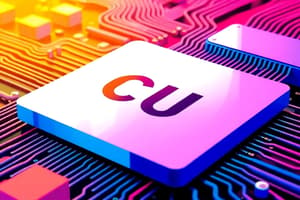Podcast
Questions and Answers
What is the primary function of any CPU?
What is the primary function of any CPU?
- Handling input/output devices
- Executing instructions (correct)
- Managing multiple programs simultaneously
- Memory management
Which task is NOT a key function performed by CPUs?
Which task is NOT a key function performed by CPUs?
- Memory management
- Calculating user expenses (correct)
- Executing complex instructions
- Managing multiple programs simultaneously
What is one of the functions of a CPU in terms of memory management?
What is one of the functions of a CPU in terms of memory management?
- Running multiple applications simultaneously
- Controlling input/output devices
- Assigning memory addresses
- Moving information between different types of memory (correct)
Which of the following is NOT a type of peripheral device managed by a CPU?
Which of the following is NOT a type of peripheral device managed by a CPU?
What enables modern CPUs to allow users to run many applications at the same time?
What enables modern CPUs to allow users to run many applications at the same time?
In a typical computer system, what does the CPU aim to achieve by moving information between different memories?
In a typical computer system, what does the CPU aim to achieve by moving information between different memories?
Flashcards are hidden until you start studying
Study Notes
CPU Functions
Modern central processing units (CPUs) serve multiple purposes within computing systems, handling various tasks to ensure efficient operation of computers. Here's a look at some key functions performed by CPUs:
Executing Instructions
The primary function of any CPU is executing instructions given to it by computer programs. These instructions can range from basic arithmetic operations like addition and multiplication to more complex ones such as controlling input and output devices.
Handling Input/Output Devices
Computer systems often have numerous peripheral devices connected to them. A CPU manages these inputs and outputs, including mice, keyboards, printers, scanners, digital cameras, microphones, speakers, joysticks, gamepads, smart cards, and so forth.
Memory Management
A typical computer system has several types of memory—from easily accessible temporary data storage to slower, larger secondary storage drives. It’s the job of the CPU to move information between different kinds of memories when needed, with the goal of keeping frequently used data close at hand while maintaining sufficient free space elsewhere.
Managing Multiple Programs Simultaneously
With powerful enough hardware, modern CPUs enable users to run many applications simultaneously. This happens through what we call multitasking where each program is given tiny amounts of time on the processor, allowing the user to switch seamlessly between open tasks without waiting for one task to complete before starting another.
Power Management
Aside from managing the actual workings of your computer, CPUs also control energy consumption within a device. They do this via power management techniques which efficiently manage the flow of electricity going into compute components, thereby saving battery life if using portable devices.
In summary, modern CPUs handle a wide variety of tasks within a computing system. From simple math calculations to managing multiple programs and conserving energy, they play a vital role in ensuring our computers perform smoothly and effectively.
Studying That Suits You
Use AI to generate personalized quizzes and flashcards to suit your learning preferences.




